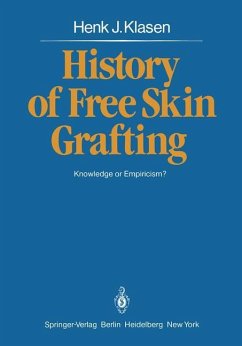- Broschiertes Buch
- Merkliste
- Auf die Merkliste
- Bewerten Bewerten
- Teilen
- Produkt teilen
- Produkterinnerung
- Produkterinnerung
Amidst the innumerable articles and books on plastic and reconstructive surgery, a thorough and extensive study of the history of free skin grafting was still missing. This omission has now been rectified by Dr. Klasen. This book is an expansion of a M.D. thesis, written at the State Universi ty of Groningen, The Netherlands, and was guided by Professor A. J. C. Huffstadt, plastic surgeon, and Professor D. de Moulin, medical historian. Professor T. Gibson kindly revised the manuscript and wrote the epilogue. But, as Goethe put it: "nur ein Teil der Kunst kann gelehrt werden, der Kunstler macht…mehr
Andere Kunden interessierten sich auch für
![Innovations in Plastic and Aesthetic Surgery Innovations in Plastic and Aesthetic Surgery]() Marita Eisenmann-Klein / Constanze Neuhann-Lorenz (eds.)Innovations in Plastic and Aesthetic Surgery152,99 €
Marita Eisenmann-Klein / Constanze Neuhann-Lorenz (eds.)Innovations in Plastic and Aesthetic Surgery152,99 €![Surgery in Solitary Kidney and Corrections of Urinary Transport Disturbances Surgery in Solitary Kidney and Corrections of Urinary Transport Disturbances]() Surgery in Solitary Kidney and Corrections of Urinary Transport Disturbances77,99 €
Surgery in Solitary Kidney and Corrections of Urinary Transport Disturbances77,99 €![Liposuction Liposuction]() Liposuction236,99 €
Liposuction236,99 €![Atlas of Anatomic Reconstruction After Skin Cancer Surgery Atlas of Anatomic Reconstruction After Skin Cancer Surgery]() Atlas of Anatomic Reconstruction After Skin Cancer Surgery165,99 €
Atlas of Anatomic Reconstruction After Skin Cancer Surgery165,99 €![Microsurgical Models in Rats for Transplantation Research Microsurgical Models in Rats for Transplantation Research]() Microsurgical Models in Rats for Transplantation Research116,99 €
Microsurgical Models in Rats for Transplantation Research116,99 €![Recent Advances in Burns and Plastic Surgery ¿ The Chinese Experience Recent Advances in Burns and Plastic Surgery ¿ The Chinese Experience]() Recent Advances in Burns and Plastic Surgery ¿ The Chinese Experience39,99 €
Recent Advances in Burns and Plastic Surgery ¿ The Chinese Experience39,99 €![Plastic Surgery in the Sexually Handicapped Plastic Surgery in the Sexually Handicapped]() Plastic Surgery in the Sexually Handicapped74,99 €
Plastic Surgery in the Sexually Handicapped74,99 €-
-
-
Amidst the innumerable articles and books on plastic and reconstructive surgery, a thorough and extensive study of the history of free skin grafting was still missing. This omission has now been rectified by Dr. Klasen. This book is an expansion of a M.D. thesis, written at the State Universi ty of Groningen, The Netherlands, and was guided by Professor A. J. C. Huffstadt, plastic surgeon, and Professor D. de Moulin, medical historian. Professor T. Gibson kindly revised the manuscript and wrote the epilogue. But, as Goethe put it: "nur ein Teil der Kunst kann gelehrt werden, der Kunstler macht das Ganze" ("only a part of the art can be taught, the artist makes the totality"). The author, Henk Klasen, is a remarkable man. As a general surgeon, he devotes all his interest and skills to traumatology and problems of phys iology and pathophysiology in surgery. With such talents it is natural that he also works parttime as one of the coordinators ofa modern burn unit. Among his hobbiesare love of antiques and old books. This historical inclination has induced him to write the present book, in which he vividly describes the development of free skin grafting in its rel evant theoretical and practical aspects. His elaborate study has resulted in an excellent reference book which at the same time provides enjoyable reading, once again demonstrating the value of history in understanding the present. A. J. C. HUFFSTADT, M.D.
Produktdetails
- Produktdetails
- Verlag: Springer / Springer Berlin Heidelberg / Springer, Berlin
- Artikelnr. des Verlages: 978-3-642-81655-0
- Softcover reprint of the original 1st ed. 1981
- Seitenzahl: 208
- Erscheinungstermin: 8. Dezember 2011
- Englisch
- Abmessung: 244mm x 170mm x 12mm
- Gewicht: 368g
- ISBN-13: 9783642816550
- ISBN-10: 364281655X
- Artikelnr.: 36122062
- Verlag: Springer / Springer Berlin Heidelberg / Springer, Berlin
- Artikelnr. des Verlages: 978-3-642-81655-0
- Softcover reprint of the original 1st ed. 1981
- Seitenzahl: 208
- Erscheinungstermin: 8. Dezember 2011
- Englisch
- Abmessung: 244mm x 170mm x 12mm
- Gewicht: 368g
- ISBN-13: 9783642816550
- ISBN-10: 364281655X
- Artikelnr.: 36122062
1. Experiences With and Views on Skin Grafting Prior to Reverdin's Invention (1869).- 2. Skin Grafting by the Reverdin Method and Subsequent Developments.- A. The Skin Grafts of Jaques-Louis Reverdin.- Reverdin's Technique of Skin Grafting.- Indications for a Reverdin Skin Graft.- General Indications.- Looking for Indications in Reconstructive Surgery.- Criteria Applied to the Wound.- Skin Grafting Technique.- Preparation of the Wound.- Technique of Obtaining Grafts.- Nature of the Grafts.- Dimensions and Thickness of the Grafts.- Application of the Grafts.- Dressing After Grafting.- The First Wound Inspection.- Consequences of Grafting.- The Reaction of the Wound.- The Reaction of the Grafts.- Wound Healing After Skin Grafting.- Results of Skin Grafting.- B. The Grafting of Epithelium Without Corium.- Epithelial Scrapings.- Warts.- Hair Roots.- C. Homografting.- Sources of Skin for Homografting.- Survival Chances of Homografts.- Complications in Homografting.- Unexplained Failures After Homografting.- D. Heterografting.- References.- 3. Skin Grafting in Eyelid Surgery.- A. Lawson's Successful Reconstruction.- B. Other Initiatives in Eyelid Grafting.- C. Wolfe and the Full-Thickness Skin Graft.- D. Further Application of the Full-Thickness Skin Graft.- E. The Split-Skin Graft in Eyelid Surgery.- F. Dressing Technique.- G. Results.- H. Skin Grafting in Other Eyelid Abnormalities.- I. Skin Grafting on Fresh Eyelid Wounds.- References.- 4. Application of the Principles of Thiersch in Skin Grafting, and Further Developments (1886-1900).- A. Skin Grafting According to the Principles of Carl Thiersch.- The Thiersch Principles Elaborated by his Pupils.- Indications for Skin Grafting in Thiersch's Surgical Department.- Preparation of the Wound.- Selection of the Donor Site.- Taking Grafts, Their Thickness and Dimensions.- Application of the Grafts.- Complications.- Application of the Thiersch Principles Outside Leipzig.- Indications for Skin Grafting.- Preparatory Measures.- Thickness and Dimensions of the Grafts.- Application of the Grafts.- Wound Dressing After Grafting.- Postoperative Treatment and Results of Skin Grafting.- Results of Skin Grafting in Ulcers of the Leg.- Healing After Split-Skin Grafting.- Changes in the Wound Bed.- Changes in the Graft.- Preservation of Skin Grafts.- B. Grafting Epithelial Scrapings.- C. The Full-Thickness Skin Graft.- Indications.- Preparations.- Selection of the Donor Site.- Preparation of the Field of Operation.- Technique of Obtaining Grafts.- Application of the Grafts.- Dressing Technique and Postoperative Treatment.- Grafting Hairy Skin.- Healing of Full-Thickness Skin Grafts.- Epidermal Changes.- Ectodermal Structures.- Corium.- Blood Vessels.- Reactions Between Graft and Wound Bed.- Conclusion.- D. The Use of Homografts and Heterografts After Thiersch's Address (1886).- Homografting.- Heterografting.- References.- 5. Skin Grafting During the First Three Decades of the 20th Century.- A. The Split-Skin Graft.- Indications.- Grafting Technique.- Anaesthesia.- The Donor Site.- Preparation of the Grafted Area.- Development of Technical Aids and Graft-Cutting Technique.- Application of the Graft.- After-Care of the Grafted Area.- After-Care of the Donor Site.- Further Investigations into Healing.- B. The Full-Thickness Skin Graft.- Indications.- Grafting Technique.- The Donor Site.- Graft-Cutting Technique.- Application of the Graft.- Variants of the Full-Thickness Skin Graft.- After-Care.- Results.- Grafting Hairy Skin.- Healing of the Full-Thickness Skin Graft.- C. New Ways in Grafting, or the Way Back?.- Indications for Small Deep Grafts.- Grafting Technique.- Preparation of the Grafted Area.- The Donor Site.- Anaesthesia.- Graft-Cutting Technique.- Application of the Grafts.- After-Care.- Results.- The Combination Technique.- D. Homografting.- Processing of Homografts.- Other Efforts to Ensure Permanent Healing of Homografts.- Homografting Tissues Other Than Skin.- Views on Failures of Homografting.- Study of the Histological Processes in Homografting.- References.- 6. Skin Grafting During the Period 1930-1950.- A. Split-Skin Grafts.- Indications.- Grafting Technique.- General Measures Prior to Skin Grafting.- Preparation of the Grafted Area.- Anaesthesia.- Instruments.- Selection of Donor Sites.- Healing of Donor Sites.- After-Care of Donor Sites.- Preservation of Skin Grafts.- Application of the Grafts.- After-Care of the Grafted Area.- Results of Skin Grafting.- Restoration of Sensibility.- Restoration of the Function of the Sweat Glands.- Restoration of the Function of the Sebaceous Glands.- Changes in Pigmentation.- Healing of Grafts.- B. Full-Thickness Skin Grafts.- Indications.- Grafting Technique.- The Donor Site.- Graft-Cutting Technique.- Application of Grafts and After-Care.- Results.- C. Homografting.- Successful Homografting in Monozygotic Twins.- New Applications.- Research into Failure of Homografting.- Histological Findings.- References.- Summary and Conclusion.- Free Skin Grafting Today and Tomorrow.
1. Experiences With and Views on Skin Grafting Prior to Reverdin's Invention (1869).- 2. Skin Grafting by the Reverdin Method and Subsequent Developments.- A. The Skin Grafts of Jaques-Louis Reverdin.- Reverdin's Technique of Skin Grafting.- Indications for a Reverdin Skin Graft.- General Indications.- Looking for Indications in Reconstructive Surgery.- Criteria Applied to the Wound.- Skin Grafting Technique.- Preparation of the Wound.- Technique of Obtaining Grafts.- Nature of the Grafts.- Dimensions and Thickness of the Grafts.- Application of the Grafts.- Dressing After Grafting.- The First Wound Inspection.- Consequences of Grafting.- The Reaction of the Wound.- The Reaction of the Grafts.- Wound Healing After Skin Grafting.- Results of Skin Grafting.- B. The Grafting of Epithelium Without Corium.- Epithelial Scrapings.- Warts.- Hair Roots.- C. Homografting.- Sources of Skin for Homografting.- Survival Chances of Homografts.- Complications in Homografting.- Unexplained Failures After Homografting.- D. Heterografting.- References.- 3. Skin Grafting in Eyelid Surgery.- A. Lawson's Successful Reconstruction.- B. Other Initiatives in Eyelid Grafting.- C. Wolfe and the Full-Thickness Skin Graft.- D. Further Application of the Full-Thickness Skin Graft.- E. The Split-Skin Graft in Eyelid Surgery.- F. Dressing Technique.- G. Results.- H. Skin Grafting in Other Eyelid Abnormalities.- I. Skin Grafting on Fresh Eyelid Wounds.- References.- 4. Application of the Principles of Thiersch in Skin Grafting, and Further Developments (1886-1900).- A. Skin Grafting According to the Principles of Carl Thiersch.- The Thiersch Principles Elaborated by his Pupils.- Indications for Skin Grafting in Thiersch's Surgical Department.- Preparation of the Wound.- Selection of the Donor Site.- Taking Grafts, Their Thickness and Dimensions.- Application of the Grafts.- Complications.- Application of the Thiersch Principles Outside Leipzig.- Indications for Skin Grafting.- Preparatory Measures.- Thickness and Dimensions of the Grafts.- Application of the Grafts.- Wound Dressing After Grafting.- Postoperative Treatment and Results of Skin Grafting.- Results of Skin Grafting in Ulcers of the Leg.- Healing After Split-Skin Grafting.- Changes in the Wound Bed.- Changes in the Graft.- Preservation of Skin Grafts.- B. Grafting Epithelial Scrapings.- C. The Full-Thickness Skin Graft.- Indications.- Preparations.- Selection of the Donor Site.- Preparation of the Field of Operation.- Technique of Obtaining Grafts.- Application of the Grafts.- Dressing Technique and Postoperative Treatment.- Grafting Hairy Skin.- Healing of Full-Thickness Skin Grafts.- Epidermal Changes.- Ectodermal Structures.- Corium.- Blood Vessels.- Reactions Between Graft and Wound Bed.- Conclusion.- D. The Use of Homografts and Heterografts After Thiersch's Address (1886).- Homografting.- Heterografting.- References.- 5. Skin Grafting During the First Three Decades of the 20th Century.- A. The Split-Skin Graft.- Indications.- Grafting Technique.- Anaesthesia.- The Donor Site.- Preparation of the Grafted Area.- Development of Technical Aids and Graft-Cutting Technique.- Application of the Graft.- After-Care of the Grafted Area.- After-Care of the Donor Site.- Further Investigations into Healing.- B. The Full-Thickness Skin Graft.- Indications.- Grafting Technique.- The Donor Site.- Graft-Cutting Technique.- Application of the Graft.- Variants of the Full-Thickness Skin Graft.- After-Care.- Results.- Grafting Hairy Skin.- Healing of the Full-Thickness Skin Graft.- C. New Ways in Grafting, or the Way Back?.- Indications for Small Deep Grafts.- Grafting Technique.- Preparation of the Grafted Area.- The Donor Site.- Anaesthesia.- Graft-Cutting Technique.- Application of the Grafts.- After-Care.- Results.- The Combination Technique.- D. Homografting.- Processing of Homografts.- Other Efforts to Ensure Permanent Healing of Homografts.- Homografting Tissues Other Than Skin.- Views on Failures of Homografting.- Study of the Histological Processes in Homografting.- References.- 6. Skin Grafting During the Period 1930-1950.- A. Split-Skin Grafts.- Indications.- Grafting Technique.- General Measures Prior to Skin Grafting.- Preparation of the Grafted Area.- Anaesthesia.- Instruments.- Selection of Donor Sites.- Healing of Donor Sites.- After-Care of Donor Sites.- Preservation of Skin Grafts.- Application of the Grafts.- After-Care of the Grafted Area.- Results of Skin Grafting.- Restoration of Sensibility.- Restoration of the Function of the Sweat Glands.- Restoration of the Function of the Sebaceous Glands.- Changes in Pigmentation.- Healing of Grafts.- B. Full-Thickness Skin Grafts.- Indications.- Grafting Technique.- The Donor Site.- Graft-Cutting Technique.- Application of Grafts and After-Care.- Results.- C. Homografting.- Successful Homografting in Monozygotic Twins.- New Applications.- Research into Failure of Homografting.- Histological Findings.- References.- Summary and Conclusion.- Free Skin Grafting Today and Tomorrow.








